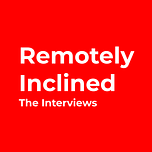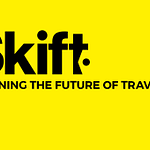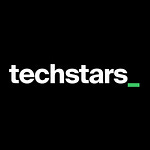Hi,
Welcome to Remotely Inclined, a newsletter about remote work and remote entrepreneurship. If you’d like to sign up, you can do so here. Or just read on…
Emily Lonetto is the head of growth at Voiceflow, acting as both an individual contributor and a people leader. Fond of the freedoms of flexible remote work, she’s now tasked with leading a fully remote team and delivering on her own work remotely. In this conversation, she shared the tools that help her lead remotely, the challenges she faces as a remote leader, and the massive business opportunity she realized from working remotely.
The challenges of leading remotely
Despite loving travel and flexible work arrangements, Emily realized that being a full-time remote leader came with its own set of challenges.
In particular, maintaining human connections was significantly more difficult when you weren’t in the office together, so Emily focused on how to empower her team to have non-work connections and conversations.
She also learned through trial and error that you can’t simply build something and expect people to engage - you have to build it with authenticity in mind.
Creating connection on remote teams
A big challenge for Emily and Voiceflow was ensuring that communication stayed high quality. The team - distributed across four countries - wanted to make sure check-ins were authentic and the team had opportunities for non-work connections.
The team uses Soapbox, Navigator, and Humble Dot for communications.
They also have individuals pick games for their weekly Friday games night, and have played Scribble and Tabletop Simulator
What remote work can teach every company
A key learning for Emily was that their processes were dependent on everyone being in the same room. While that was usually the case, it revealed a big weakness where even someone being sick and out of the office for a day could hamper progress.
By reorienting their work processes to focus on outputs for clients and value for employees, all companies can produce better products and services - this isn’t unique to remote companies.
Remote work created a necessity to find collaboration tools. However, those tools can provide assistance and benefit whether a company is remote or working in an office.
The opportunity of remote work
“Finding new tools that enable us to do more collaborative work online will provide better ways of doing our work later.”
Remotely Inclined Chats with Emily Lonetto
Transcript edited for brevity and clarity.
Stefan: Welcome, Emily! Can you kick off by sharing a bit about yourself and Voiceflow?
Emily: Absolutely. I head growth at Voiceflow - we make it easy for people to design, develop, and prototype voice apps for Alexa and Google with little to no code. More recently, we’ve focused on trying to make it possible to collaborate remotely.
What I’m working on predominantly at Voiceflow is how we scale out this design tool not only within the Alexa and Google communities but also globally.
Were you a fan of remote work before COVID-19 then?
I’ve always been the type of person who believes in balance between remote work and office work. Even though I love being in an office, I’d jump out and take a bit of a break from that.
I’ve always been pro-remote work and pro-remote when trying to find the right talent as well. One of the things I’ve found amazing about remote work is opening up your talent pool. Despite the fact that Voiceflow is headquartered in Toronto, we have members who are based in Paris and Belarus. I’m also currently in San Francisco. I think remote work makes it possible for us to tap into some talent that would otherwise be unavailable.
Did you always have a mixed team in terms of in-office and remote?
Yeah! The vast majority of our team is in Toronto, but we had a small team in Paris and hired someone in Belarus before COVID-19 broke out. I would by no means say we were super remote-ready at that time, but I understood that it was something we were working towards.
COVID-19 really forced our hand into taking remote work from a side conversation and goal into something we had to act on quickly.
What’s it like trying to be a people leader remotely?
It was something I’d been preparing for since I just moved out to San Francisco, but now it’s about getting more pointed with the channels we use - having the right type of check-ins and making sure the culture piece is there.
A big thing I realized once we all went remote is how much of our culture was built on personal conversations - stuff that doesn’t necessarily revolve around work. So I know myself and the rest of the leadership team have been really focused on creating space that isn’t dependent on physical location for us to bond and maintain our culture.
What successes and failures have you had when it comes to preserving culture in a remote work environment?
Our first gut instinct was to create a Slack channel for people to do side conversations. We assumed if we built it, they would come - which everyone knows is not true. The channel ended up being like a general channel that kind of died out.
The next effort was to form channels around certain activities. So we had a channel to talk about Call of Duty, which wasn’t the most inclusive activity for folks who don’t play, like myself.
Now, we’ve pivoted a channel we already had called Remote Committee, which was something we built before COVID-19 blew up to share not just games we could do together but also tools to make it easier for us to work together in different capacities
We’ve since started using:
Navigator
All of which have been really great ways of auto-checking in with people on the team. I use it to do ice breakers and get streamlined check ins with my team still in Toronto. We also started to rotate responsibility for who would choose our Friday games night game, and we’ve now played Scribble and Tabletop Simulator.
Are the challenges of remote work different for you as a people leader versus as an individual contributor?
It’s really challenged the way I dive in as a leader. It’s a lot easier for me to block off time to focus on individual contributions, but I also have more time to think about optimizing how I work with my team.
Previously, it was the other way around. It was easy to do check-ins with my team or sit next to someone or pair work with someone. Now we have to figure out new ways to do that or find tools to enable us to do that.
Some of the tools we had chosen or workflows we created were so dependent on us being physically together. That would have made it difficult if we didn’t have every team member in the office. So us being forced into remote work and into this activity of finding new tools that enable us to do more collaborative work online will provide better ways of doing our work later.
You also used to travel frequently for work - how has it been sheltering in place?
It’s been weird. I think there’s no real way of preparing for this kind of shift. It’s not working remotely. It’s not traveling and experiencing a new city like I’m used to. It’s just lockdown - and trying to control your schedule.
As someone so used to having their calendar dominated with travel, meetings, or keynotes, it’s challenging. It totally changed our companies OKRs (Objectives and Key Results) in terms of what we’re focused on for growth, marketing, and really had us focused on accessibility and mental health for our clients and team members.
It’s also provided a lot of insight on how we can make sure that we’re people-focused and not just placed-focused. It was a subconscious thing, but we started to realize it more as our team is no longer physically in the same space.
Absolutely. COVID lockdown is not remote work. But has your experience so far changed how you view remote work?
It’s really changed the way I think about creating opportunities for my team members to show off what they’re working on and it’s redefined the way we think about user engagement.
Previously, we were focused on traditional channels like email and engaging with an app or in-person events. But we weren’t diving in beyond that. With all-hands, we’re trying to shift away from leaders talking and instead getting individual contributors to do live demos - so they can be the thought leaders and we can provide real estate for them to do that.
It’s changed our workflow as well. We found there was a lot of wasted time in meetings previously - now that time is much better utilized as we’re genuinely checking in. We want to work together and are excited for that moment where we’re actually working on things in tandem.
Amazing, thank you!
You can connect with Emily on Twitter.












